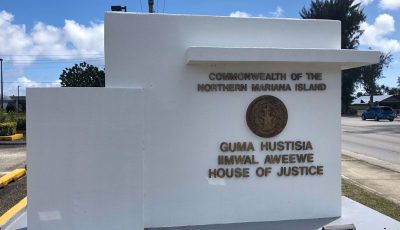Inos suspends Wiseman’s order for partial payment of $200K to estate heirs
CNMI Supreme Court Associate Justice Perry B. Inos has suspended Superior Court Associate Judge David A. Wiseman’s order concerning the partial distribution of $200,000 to the heirs of an estate, that received a grand total of $2.8 million from the government for just compensation over the taking of property and rental payments.
In an order issued last Wednesday, Inos said the high court finds the circumstances in this matter warrant a partial stay of Wiseman’s Dec. 23, 2014, order granting partial distribution of Rita Rogolifoi estate’s money pending resolution of petitions for writ filed by attorney Brien Sers Nicholas.
Nicholas, served as counsel for Rogolifoi’s estate’s then administrator Enrique Seman.
In his petition for a writ of mandamus, Nicholas asked the high court to issue an order mandating Wiseman to vacate his Dec. 23, 2014, order granting partial distribution and administrator’s and attorney’s fees.
In the same petition, Nicholas also requested the court issue an order mandating Wiseman to issue an order directing the administrator and the heirs to return to the estate of Rita Rogolifoi all funds received in light of the Dec. 23 order.
In his petition for a writ of prohibition, Nicholas requested the high court to prohibit Wiseman from issuing any further orders in the estate pending the full and complete resolution of Nicholas’ claim before the high court.
In the Supreme Court’s order last week, Inos further ordered that current estate administrator Clarence “Bud” White file an answer to the petition on or before Jan. 21, 2015.
Inos invited the Superior Court to file an amicus brief (friend of the court) by the same date.
An amicus curiae is a brief filed in court by an entity who is not a party to the case.
Nicholas filed the petitions for a writ last Dec. 29 because of Wiseman’s Dec. 23 order.
In that Dec. 23 order, Wiseman denied Nicholas’ ex parte request to the court for a hearing for approval of a joint motion of a settlement of his claim for attorney’s fees.
Ex parte refers to an application to the court by one of the parties to the action without the other party being present or heard.
Wiseman said regarding the underlying joint-settlement motion, for him to schedule a hearing to entertain a post-decision settlement on the very issue he ruled upon is without judicial precedent.
“In viewing the history of this claim, the court is bewildered as to how settlement is proper after this court already awarded damages,” the judge said.
Wiseman said that, on Dec. 17, 2014, after reviewing Nicholas’ and the administrator’s briefs, and after receiving oral arguments, he issued a published order finding that there was no valid contingent fee agreement and that the lawyer was entitled to an award of $99,256.76, for a grand total award of $170,263.01.
Wiseman said Nicholas now brings this ex-parte motion requesting that the court shorten the time for a hearing to bring a joint-settlement agreement proposal before the court after the court issued an order on the very issue of claimant’s (Nicholas) attorney’s fees.
In the Dec. 17 order, Wiseman found not reasonable Nicholas’ request for payment of $782,363.74 in legal fees for representing then-administrator Seman.
Wiseman, however, determined that $170,263.01 is the reasonable fee and ordered the estate of Rita Rogolofoi to pay an additional $99,256.76 to Nicholas for his legal services.
The judge said $99,256.76 is the retainer agreement fee balance after deducting the $71,006.25 previously paid to Nicholas.
In finding that Nicholas’ requested recovery of $782,263.74 was not reasonable, Wiseman ruled that Rita Rogolofoi’s heirs have not approved the contingent fee agreement between the lawyer and then estate administrator Seman.
Wiseman said the retainer agreement, as twice amended, does not contain a valid contingent fee agreement.
In his petitions for a writ, Nicholas said in the Dec. 23, 2014 order, Wiseman pointed out that he issued the order after having reviewed the accounting he ordered from the administrator.
“It is interesting to note that, in said accounting, the administrator basically informed Judge Wiseman also that the settlement reached with petitioner (Nicholas) regarding petitioner’s claim was in the best interest of the estate,” Nicholas said.
Nicholas said per the administrator’s counsel, Stephen Nutting, Wiseman was not interested in approving the settlement.
Nicholas said prior to the filing of the joint motion in this case and with his (Nicholas) consent, Nutting attempted his best to have the settlement approved but to no avail.
He said therefore by mutual agreement, the administrator through its counsel, Nutting, and him (Nicholas) on Dec. 23, 2014, submitted a joint motion for approval of said settlement to Wiseman along with petition submitting the necessary pleadings to try to have an expedited hearing on the same.
He pointed out that on the same day, Dec. 23, 2014, Wiseman denied the expedited hearing sought for the approval of said settlement.
Nicholas asserted that he is entitled to have his claim fully heard not only by Wiseman, but also by the high court, before any distributions are made to the heirs.
Nicholas said he has suffered irreparable harm given that there exist great likelihood that the funds that could be used to pay his claim are now in the hands of the heirs with the danger that the same will not be recovered.
“To begin with, while the administrator was willing to settlement petitioner’s claim, Judge Wiseman refused,” Nicholas said.
Nicholas said until the high court has pass judgment on his contingency fee claim, no distribution to any heirs is permitted as a matter of law.
Nicholas said the high court has yet to pass judgment on his contingency fee agreement in this case.
Yet, he added, Wiseman proceeded to grant the administrator’s renewed request for distribution to the heirs contrary to the legal mandate of the statute.
On Wiseman’s note that a post-decision settlement has no judicial precedent, Nicholas pointed out that to the contrary, it is not uncommon for settlement to be reached after a trial, whether bench trial or a jury trial.
Nicholas said the high court’s own rules allow for post judgment settlement while an appeal is pending.
According to court records, in November 2004, then-administrator Seman retained the services of attorney Nicholas to represent him in Rita Rogolofoi estate’s probate matter and in the separate, but related action, the Board of Marianas Public Lands Authority versus the heirs of Rita Rogolofoi.
On May 12, 2009, the Superior Court entered a judgment in favor of the administrator in the quiet title action, awarding the heirs to the estate of Rogolofoi fee simple ownership and titles to two lots containing some 33,927 square meters.
The heirs were also awarded a total of $2,690,020.07, which represented “just compensation” for certain government takings and rental payments collected by the Department of Public Lands, plus nine percent post-judgment interest.
The total judgment award plus post-judgment interest came out to a grand total of $2,844,566.64.
Pursuant to the retainer agreement and negotiations with the administrator, Nicholas sought 30 percent of the grand total recovery for a total sum of $853,369.99 in attorney’s fees.
Nicholas then filed a petition for instructions, requesting that the court address the matters regarding the remaining balance of his attorney’s fees claim in the amount of $782,363.74.
But Wiseman said Nicholas failed to overcome the presumption that the subsequently entered contracts between Nicholas and administrator were invalid.



























